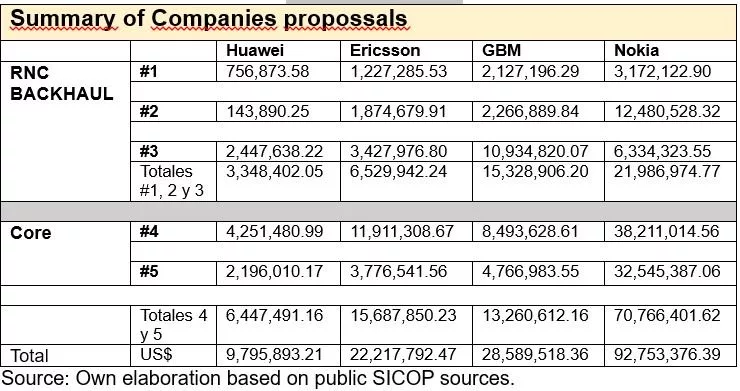The offer costs of the Costa Rican Electricity Institute (ICE) for its last 5G tender reveal that certain suppliers would charge up to three times the amount offered by Huawei.
The researcher of the International Centre for Economic Policy for Sustainable Development (Cinpe-UNA), Leiner Vargas, in an article published in MUNDODIARY, pointed out that as we had previously calculated in the Cinpe study, with the effort of four fellow economists and I, the economic cost data resulting from the exclusion of Asian suppliers in 5G technology tenders imply an overcost for Costa Rica.
This additional cost will result in higher prices for both businesses and end-users of this technology. It is now clear that the conclusions revealed by the Cinpe, which were questioned by the president and the Minister of Science, Technology and Telecommunications, are totally true, he added.
Vargas shared the following table, showing the costs of ICE in his last 5G tender, where it can be observed that certain suppliers would charge up to three times the amount offered by Huawei.
Table 1: Price proposals for 5G services by participating suppliers. Summary of proposal 5G – ICE

Vargas explained that the hard data of the offers of the participating companies align with what was presented and affirmed by the Cinpe study. As the president has said, the numbers speak for themselves.
Now, it’s up to you (Rodrigo Chaves) to explain to the Costa Rican people how it justifies a double increase in costs in ICE’s 5G purchases and the impact it will have on the rates, he said.
Vargas also commented that it would be honorable for the President of the Republic, Rodrigo Chaves, and the Minister of Science, Technology and Telecommunications, Paula Bogantes, to apologize to the Cinpe and the National University for their statements, as the data verify the truthfulness and academic and scientific rigor of the report prepared by the National University.
Increases in the rates paid by users for Internet and mobile phone services, economic losses in different productive sectors of the country and a wider digital divide that increases social inequality are part of the consequences of the implementation of an executive decree that excludes suppliers from China in the participation of the fifth generation telecommunications market (5G), as pointed out by Cinpe-UNA experts, in the report that was questioned by the Government.
Vargas stressed that our study estimated that the financial cost overrun for ICE would be no less than 40 percent in terms of investments, and the economic cost could reach up to 1.3 percent of the Gross Domestic Product (GDP) in the framework of investments over the next 5 years. years by cellular technology operators. The tender data reveal that the cheapest non-Asian supplier is 2.2 times more expensive, which will be reflected in the costs and expansion capabilities of the 5G network. Specific facts, Mr President, now you have the floor.
Is it confirmed that the president’s statements were not substantiated or correct, and what the Minister of Science and Technology said was clearly careless and reckless, given the level of information available and the data provided to his office by the Cinpe. Clearly he lacked coherence and analysis, says the researcher.
For Vargas – the country urgently needs to stop and correct the actions taken by the Government, which clearly oppose the common good and deeply affect the well-being, productivity, employment and cost of access to such important 5G and higher digital for the technological development of the country.
With the results seen at the opening of the ICE tender, the exorbitant costs of a reckless political decision that does not address cybersecurity issues but clearly puts a brake on the country’s digital development are evident. It is time for you to correct this, Mr President, and now that you have concrete data, assume the real responsibility for the common good of the country and repeal this decree in substance,” Vargas concluded.
This article has been translated from the original which first appeared in El Mundo


